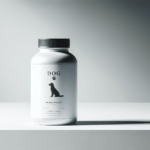
In “How to Ensure the Health and Well-Being of Your Canine Companion,” you’ll discover essential advice on keeping your furry friend happy and healthy. From selecting the best diet to consulting with veterinarians, this guide covers everything you need to know. You’ll learn about the importance of routine vaccinations, dental cleanings, and specialized supplements. With insights into the best practices for maintaining your dog’s joint, skin, and overall health, this article is your go-to resource for ensuring your canine companion enjoys a long, vibrant life. By incorporating expert tips and high-quality products, you can support every aspect of your dog’s well-being, making sure they thrive at every age. What does it take to take care of a dog? As a dedicated dog owner, you’re always seeking ways to ensure the health and well-being of your furry companion. Dogs give us unconditional love and loyalty, and in return, they deserve attentive and informed care. In this comprehensive guide, let’s explore a variety of topics that will support you in providing the best life possible for your canine friend.
Understanding Your Dog’s Health and Well-Being
The foundation of caring for your dog is understanding what constitutes their overall health and well-being. This includes physical health, mental stimulation, social interactions, and emotional connections.
Physical Health
Physical health is not just about the absence of disease; it includes maintaining a healthy weight, supporting immune function, and ensuring strong bones and joints.
- Diet: A balanced diet is crucial for maintaining your dog’s health. This includes a mix of proteins, carbohydrates, fats, vitamins, and minerals.
- Exercise: Regular physical activity helps maintain a healthy weight, improve cardiovascular health, and keep joints flexible.
- Regular Veterinary Visits: Routine checkups can help catch potential health issues early and ensure your dog is up-to-date on vaccinations.
Mental and Emotional Health
Mental stimulation is just as important as physical well-being. Engage your dog with toys, training sessions, and interactive games to keep their mind sharp. Additionally, providing companionship, whether it’s from you or other dogs, helps fulfill their social needs.
Choosing the Right Diet
Your dog’s nutrition plays a pivotal role in their overall health. A well-balanced diet supports everything from energy levels to skin health.
Types of Dog Food
There are several types of dog food available, and choosing the right one can be daunting.
Dry Kibble
Dry dog food is convenient and has a long shelf life. It’s primarily recommended for its ability to help keep your dog’s teeth clean due to its texture.
| Advantages | Disadvantages |
|---|---|
| Long shelf life | May be less palatable |
| May help with dental health | Often requires preservatives |
| Convenient and easy to store | Lower moisture content |
Wet Food
Wet food often comes in cans or pouches. It’s generally more palatable for dogs and contains higher moisture content, which can benefit hydration.
| Advantages | Disadvantages |
|---|---|
| Higher moisture content | Shorter shelf life |
| More palatable | Typically more expensive |
| Easier to chew | Can lead to dental issues if used exclusively |
Raw Diet
Raw diets mimic what wild dogs might eat and often consist of raw meat, bones, and vegetables. This type of diet is controversial and requires careful planning to ensure it meets all of your dog’s nutritional needs.
| Advantages | Disadvantages |
|---|---|
| Can lead to shinier coats | Risk of bacterial contamination |
| Promotes dental health | Requires careful meal preparation |
| More natural diet | Can be expensive |
Supplements and Vitamins
Just like humans, dogs can benefit from supplements that support various aspects of their health, from joint care to skin health.
Popular Dog Supplements
- Omega-3 Fatty Acids: Help maintain healthy skin and coat and support heart health.
- Glucosamine and Chondroitin: Essential for joint health, especially in senior dogs.
- Probiotics: Aid in digestive health and improve bowel movements.

Regular Veterinary Care
Building a relationship with a trusted veterinarian is essential. They can guide you through all stages of your dog’s life, from puppyhood to senior years.
Routine Checkups and Vaccinations
Regular checkups can help catch early signs of potential health issues. Vaccinations are crucial in preventing diseases like rabies, distemper, and parvovirus.
| Age Group | Recommended Care |
|---|---|
| Puppies | Initial vaccinations, deworming, and first veterinary visit |
| Adult Dogs | Annual vaccinations, regular dental cleanings, and wellness exams |
| Senior Dogs | Semi-annual checkups, specialized senior dog care |
Dental Health
Maintaining your dog’s dental health is vital for their overall well-being. Dental disease can lead to more serious health issues.
Tips for Dental Care
- Regular Cleanings: Schedule dental cleanings with your veterinarian.
- Brushing: Brush your dog’s teeth regularly with dog-specific toothpaste.
- Chew Toys: Use dental chews and toys designed to reduce tartar and plaque.
Exercise and Physical Activity
Exercise is essential for preventing obesity, reducing behavioral problems, and maintaining cardiovascular health.
Types of Exercise
Different activities cater to dogs of various ages and energy levels.
For Young and Active Dogs
- Fetch: Great for physical exertion and mental stimulation.
- Agility Training: Helps improve coordination and strengthens the bond between you and your dog.
For Older Dogs
- Leisurely Walks: Focuses on maintaining joint mobility.
- Gentle Swimming: Provides a low-impact workout that’s easy on the joints.

Supporting Joint Health
Joint health becomes particularly crucial as your dog ages or if your dog has a breed predisposition to joint issues.
Joint Health Supplements
- Glucosamine and Chondroitin: These supplements are widely recognized for their ability to support cartilage and joint health.
- Fish Oil: Rich in Omega-3 fatty acids, which help reduce inflammation.
- Green-Lipped Mussel: Known for its anti-inflammatory properties.
Importance of Socialization
Socialization helps develop a well-adjusted dog who is comfortable in a variety of settings and with different people and animals.
Tips for Socializing Your Dog
- Puppy Classes: Early training and socialization classes can set a positive tone for future interactions.
- Dog Parks: Regular visits to dog parks offer social opportunities with other dogs.
- Playdates: Arrange playdates with dogs of friends and family.

Mental Stimulation
Keeping your dog mentally engaged reduces the risk of behavioral problems and enriches their lives.
Ways to Stimulate Your Dog’s Mind
- Puzzles and Interactive Toys: Toys that challenge your dog to think and problem-solve.
- Training Sessions: Introducing new commands and tricks keeps your dog mentally sharp.
Natural Remedies and Holistic Approaches
Natural remedies can offer additional support for maintaining your dog’s health and managing minor ailments.
Common Natural Remedies
- Herbal Supplements: Herbs like chamomile and valerian can have a calming effect.
- Homeopathic Remedies: Used for treating minor issues like anxiety or digestive upsets.
- Aromatherapy: Essential oils like lavender can help soothe an anxious dog, but always consult your vet first.
Emergency Care and First Aid
Being prepared for emergencies can make a critical difference in your dog’s health and survival.
Building a Canine First Aid Kit
Your kit should include:
- Bandages
- Antiseptic wipes
- Tweezers
- Hydrogen peroxide
- Digital thermometer
- Saline solution
Recognizing Emergencies
Know the signs that require immediate veterinary attention, such as:
- Severe bleeding
- Difficulty breathing
- Unresponsiveness or extreme lethargy
- Ingestion of toxic substances
Conclusion
Ensuring the health and well-being of your canine companion requires a multi-faceted approach. From choosing the right diet and maintaining regular vet checkups, to providing mental stimulation and social opportunities, every aspect plays a vital role in your dog’s overall quality of life. With your dedication and love, you can help your dog enjoy a healthy and fulfilling life by your side.
Remember, every dog is unique, and what works for one may not work for another. Always consult with your veterinarian regarding the best practices for your specific dog’s needs. Here’s to many happy, healthy years with your faithful friend!







